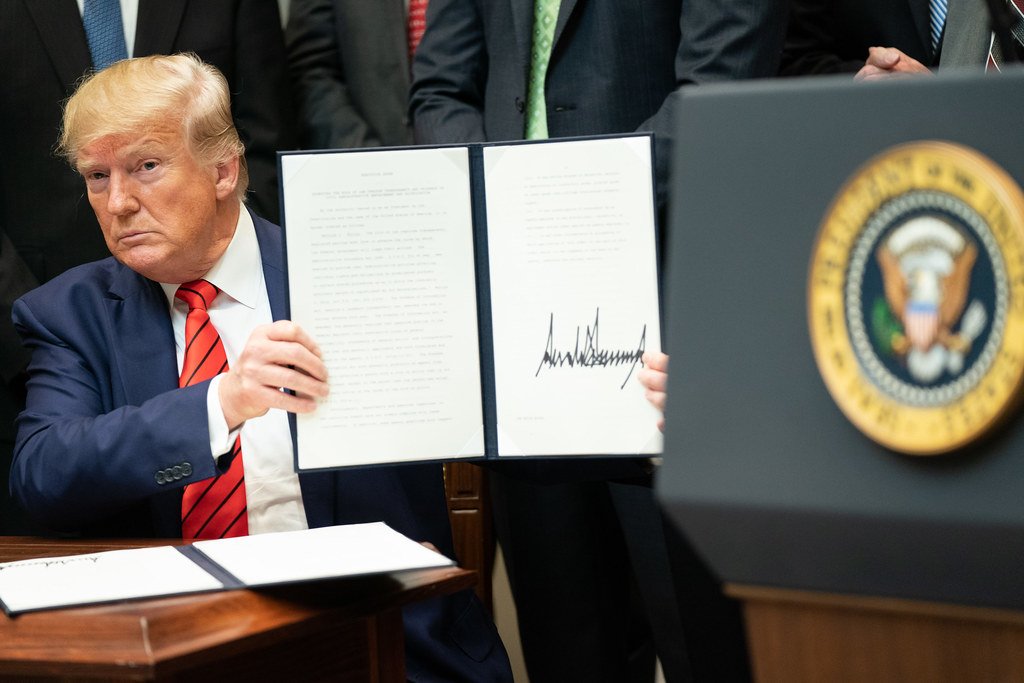Understanding the Legal Landscape of the Trump Administration: The Issue of Personal Records Access
As the Trump administration enters its second term, it faces a significant number of legal challenges, with sources tracking as many as 126 lawsuits as of March 15. This article delves into some of these challenges, particularly those relating to the Department of Government Efficiency (DOGE) and its access to personal financial records.
Executive Orders and the Establishment of DOGE
On January 20, President Trump signed Executive Order No. 14158, which formally created the DOGE. The purpose of this initiative is to enhance governmental efficiency through the modernization of federal technology and software. Among other responsibilities, the order renamed the United States Digital Service to the United States DOGE Service (USDS), integrating it into the Executive Office.
Another executive order, No. 14210, was issued on February 11, with the goal of transforming the federal bureaucracy by reducing the workforce and eliminating inefficiency.
The Privacy Act: Key Considerations
A central issue surrounding these initiatives is the potential conflict with the Privacy Act of 1974, which safeguards personally identifiable information (PII) collected by government agencies. The Privacy Act prohibits agencies from disclosing records unless it follows certain exceptions, including the need-to-know provision for employees performing their duties.
Litigation Overview
Several lawsuits have emerged challenging the legality of granting DOGE staff access to PII in government records. Plaintiffs, including organizations representing federal workers, veterans, and student loan borrowers, seek injunctions to block such disclosures based on the Administrative Procedure Act, arguing that it violates the Privacy Act.
Scope of Affected Agencies
Notable defendants in these lawsuits include various federal entities, such as:
- Department of the Treasury
- Office of Personnel Management
- Department of Education
- Department of Labor
- Department of Health and Human Services
- Consumer Financial Protection Bureau
- Internal Revenue Service
- Social Security Administration
This breadth highlights the extensive nature of DOGE’s potential access to sensitive information, which includes social security numbers, tax records, and personal financial details.
Preliminary Court Decisions
Courts have recently ruled on motions for temporary restraining orders (TROs) and preliminary injunctions in several of these cases. To succeed, plaintiffs must typically demonstrate a likelihood of success on the merits, the risk of irreparable harm, a favorable balance of equities, and that granting an injunction serves the public interest.
In many instances, courts found the plaintiffs could not establish irreparable harm or success on the merits. For example, in the case of Alliance for Retired Americans v. Bessent, the court determined that while the risk of unauthorized disclosure could confer standing, it did not equate to irreparable harm absent actual public disclosure of private information. The limited access by DOGE-affiliated employees, who were bound by confidentiality, was deemed insufficient for injunctive relief.
Contrasting Outcomes
Interestingly, in some cases, courts have granted plaintiffs TROs, specifically noting that access granted to DOGE employees was excessively broad—beyond what was needed for their official duties. In one ruling, American Federation of Teachers v. Bessent, the court criticized the lack of justifiable reasons for such expansive access to sensitive records and concluded that ongoing unauthorized disclosures constituted irreparable harm.
Future Legal Implications
As these cases continue through the judicial process, key legal questions remain. One crucial matter is whether DOGE employees fall under the employment of the respective agencies or the USDS, which may impact their access to records under the Privacy Act. Additionally, there’s ongoing debate about whether disclosure protocols have been adhered to properly and whether exceptions to nondisclosure apply in these circumstances.
Protecting Privacy in a Digital Age
The challenges presented by DOGE’s initiatives echo broader concerns regarding data privacy. The original intent of the Privacy Act was to safeguard against the sweeping collection of personal information by governmental agencies. As highlighted by Judge Deborah Boardman, the unprecedented scale of data access raises significant legal and ethical implications that should not be overlooked.
While efforts to improve governmental efficiency are commendable, they must not come at the cost of individuals’ privacy rights. As the legal battles unfold, it is critical that judicial decisions uphold the foundational principles of the Privacy Act, balancing government efficiency with the protection of personal data.
Conclusion
In summary, the legal challenges to the Trump administration’s access to personal records involve complex interactions between executive authority, privacy rights, and statutory protections. Continued scrutiny and litigation will be essential in shaping the future of these policies and their impact on civil liberties.

